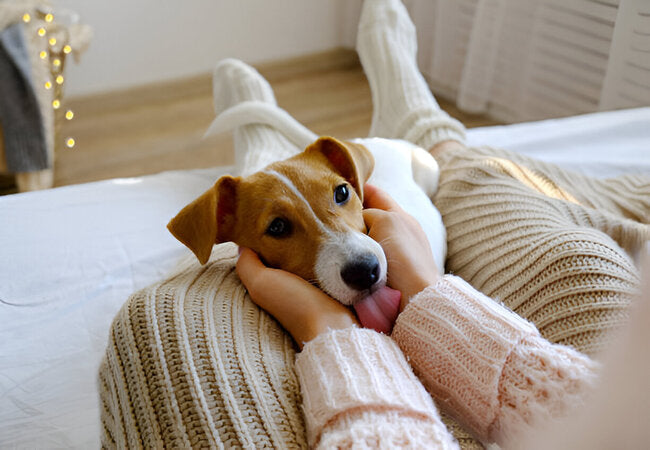Why Dogs Lick You in 2025 – Vet‑Reviewed Reasons & Tips 🐶💧

In this article
Why Dogs Lick You in 2025 – Vet‑Reviewed Reasons & Tips 🐶💧
By Dr. Duncan Houston BVSc
Face smooches, gentle tongue strokes—or that awkward long lick on your arm…why does your dog do it? In this 2025 vet-approved guide, we unpack the many reasons behind your dog’s licking behavior, how it relates to bonding and communication, when it may suggest stress or medical issues, and what you should do (or not) when your pup starts drooling your way. Let’s dig in! 🐾
1. A Sign of Affection & Social Bonding
Licking often acts as doggie “kisses,” rooted in pack bonding and appeasement. PetMD notes that face-licking “is a gentle approach…communicating they are non-threatening”. AKC’s Dr Burch explains it may also feel secure, mimicking how puppies were groomed by mom.
Plus, oxytocin—“love hormone”—rises in both dogs and owners during calm touch, reinforcing connection.
2. Grooming & Pack Behavior
In the wild, dogs lick each other for grooming and social cohesion. This behavior extends to humans—our dogs may try to groom us, reinforcing their social bond. Licking also spreads scent and strengthens familiarity.
3. Taste & Scent Exploration
Your salty skin, food residues, or even lotion flavors can trigger licking. Even though dogs have fewer taste buds than humans, their strong sense of smell enhances flavor exploration. Tiny Terrier confirms: “You taste good!”.
4. Attention-Seeking Behavior
Your pup quickly learns that a lick gets a reaction—petting, talking, treats. CBS News shares that it’s “a little request” for love and attention. If it works, they’ll do it again and again.
5. Self-Soothing & Stress Relief
Licking isn’t always happy—it can be calming. The Kennel Club notes it may indicate stress or self-soothing, and dogs may lick to ease anxiety, pain, or boredom. The Spruce Pets echoes: if licking is repetitive and context-free, it may signal anxiety.
6. Empathy & Comforting You
Dogs sense owner stress. Zeus for Dogs explains that your pup may lick you to offer comfort, mirroring their instinct to nurture. This affectionate behavior may reduce your cortisol and increase oxytocin.
7. Exploring Health or Medical Concerns
Occasionally, licking relates to wounds or inflammation. As Wikipedia notes, animals lick wounds possibly due to antimicrobial enzymes, but if your dog licks excessively or at specific body regions, consult your vet.
📋 Interpreting Context & Body Language
To understand your pup’s motive, observe these cues:
- Affectionate licking: relaxed posture, wagging tail, direct eye contact.
- Appeasement or greeting: soft eyes, lowered head, gentle licks.
- Attention-seeking: licking followed by pacing, whining, or engaging look.
- Stress licking: repetitive in a patternless way, often combined with yawning, lip-licking, or tense body stance.
- Medical licking: focused on one area, possibly with redness or self-trauma.
✅ Is It Safe or Concerning?
Generally safe—but keep these in mind:
- Most dog saliva isn’t dangerous, but avoid letting them lick open wounds or mucous membranes to prevent infections.
- If licking is borderline obsessive or persists over time, it may signal anxiety, boredom, or medical issues—seek a vet’s advice.
- Be aware of rare zoonotic bacteria. Immunocompromised individuals should limit contact.
🔄 When & How to Redirect Licking
- If affectionate, accept. Just be mindful of hygiene and boundaries.
- Ignore attention‑seeking licks and instead reward calm behavior.
- Offer enrichment: toys, playtime, training—redirect licking as an outlet for energy.
- Manage stress: identify triggers, consider calming tools (Adaptil, wraps), use training and positive routines.
- Seek vet evaluation if licking is excessive, region-specific, or accompanied by behavioural or physical changes.
📱 Ask A Vet App 2025 Support
Need help understanding your dog’s licks? Use the Ask A Vet app to:
- Upload videos showing patterns and context of licking behavior.
- Receive custom training or stress-relief plans.
- Consult a vet if licking seems compulsive or symptomatic of a health issue.
Expert guidance to help you enjoy—or manage—those wet canine kisses, 24/7. 🐾📲
❤️ Final Thoughts
Dog licking is multi-layered, expressing affection, social bonding, curiosity, stress relief, or even empathy. By paying attention to context and body language, you’ll better understand and respond appropriately. Most licking is harmless—and often sweet. But when it becomes obsessive or unusual, knowing when to redirect or seek help ensures both you and your dog stay happy, healthy, and connected. Cheers to more joyful, informed kisses! 🐶💖
Need personalized help? Visit AskAVet.com or download the Ask A Vet app for expert insights on your dog’s behavior.






